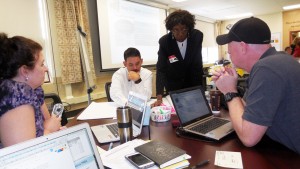
Lean Six Sigma Master Black Belt Norma Simons (standing), discusses impact improvements regarding facility use with Marion City Schools staff members (l-r) Jennifer Ratliff, Stephen Fujii, and Brian Mitchell.
School may be out but a team of Marion City School staffers will be working throughout the summer – and beyond – to make improvements to the district’s overall operations.
At the heart of their work is “Lean Six Sigma,” a structured problem-solving process to reduce costs and provide measurable bottom line improvements. First applied in the manufacturing industry, LSS is now being used in healthcare, government, and more recently, education.
Marion City Schools is one of just a few districts in the State of Ohio to incorporate LSS into its operations, thanks to its partnership with the Alber Enterprise Center at The Ohio State University at Marion.
“We are looking forward to learning and applying the concepts of Lean Six Sigma in our areas,” said Gary Barber, superintendent of Marion City Schools, in charge of the district’s 3,000 students and 700 staff members. “Everyone is committed to learn the material and take back and apply something that would be of benefit in their area to improve quality.”
Barber said that working with the Alber Enterprise Center is ideal since the organization can provide a major portion of the training online. It’s difficult, Barber notes, to have teachers, staff and administrators out of the office for a week or more to attend training. Instead, the teams can participate in webinars, online learning and discussion, then meet in person with Norma Simons, LSS master black belt and Alber education partner, to apply the concepts to specific projects previously identified by the school district.
Throughout the previous year, Marion City School leadership teams met with staff to identify four projects in which they could apply the Lean Six Sigma approach: 1) purchase orders/requisitions, 2) facility use, 3) professional development, and 4) busing.
“We know we can do better in each of these areas,” Barber points out. “Lean Six Sigma is giving us the tools to do just that.”
Take busing, for instance. With the creation of six new elementary schools throughout the city, busing has “exploded” as more than 2,300 students are transported each and every day, explains Jennifer Fosnaugh, district transportation secretary.
“Children have different schedules every day, too,” she explained. “Maybe one day they go to day care, the next to an offsite after-school program, and the next to a friend’s house. It’s imperative for their safety that our schedules run smoothly and in a timely manner.”
A nationwide shortage of bus drivers is yet another ongoing challenge they face. However, with the LSS process, Fosnaugh explains that her team is using “actual data and statistics to identify real problems, not just what we think those issues are. And we’re coming up with real solutions that we’ll be able to implement over the summer – before the start of the next school year.”
Another project centers on the use of the district’s school buildings – especially Harding High School – by outside groups. “Through Lean Six Sigma, we’re identifying a centralized process not only for availability, but also for scheduling, usage costs and so on,” explained Brian Mitchell, MCS facilities supervisor. “Communication is a big part of our process, so we’re looking at that as well.”
Winnie Brewer, MCS food services director, and a member of the group looking at improvements in the professional development process, says she is anxious “to see where all of our work lands – to see our improvements.”
“What’s best,” she adds, “is that (LSS) focuses on the process, not on personalities. We’re scientifically finding the root cause of our challenges – using data, and then looking at data to see how our solutions are having an impact.”
As part of Lean Six Sigma, each team also conducted a “failure analysis” to the solutions they proposed, identifying in advance: 1) what could go wrong, 2) where it will happen, 3) why it might occur, and 4) how the failure/breakdown could be avoided.
“Our teams have worked hard in becoming ‘Green Belt’ certified through the Lean Six Sigma process,” Barber added. “This is in addition to their normal responsibilities. It shows their commitment to our district – and to our most important customer, our students.”
To learn more about Lean Six Sigma or other ways to partner with the Alber Enterprise Center to enhance impact and innovation, contact Myra Wilson, director, [email protected], 740-725-6330, or visit alber.osu.edu.

